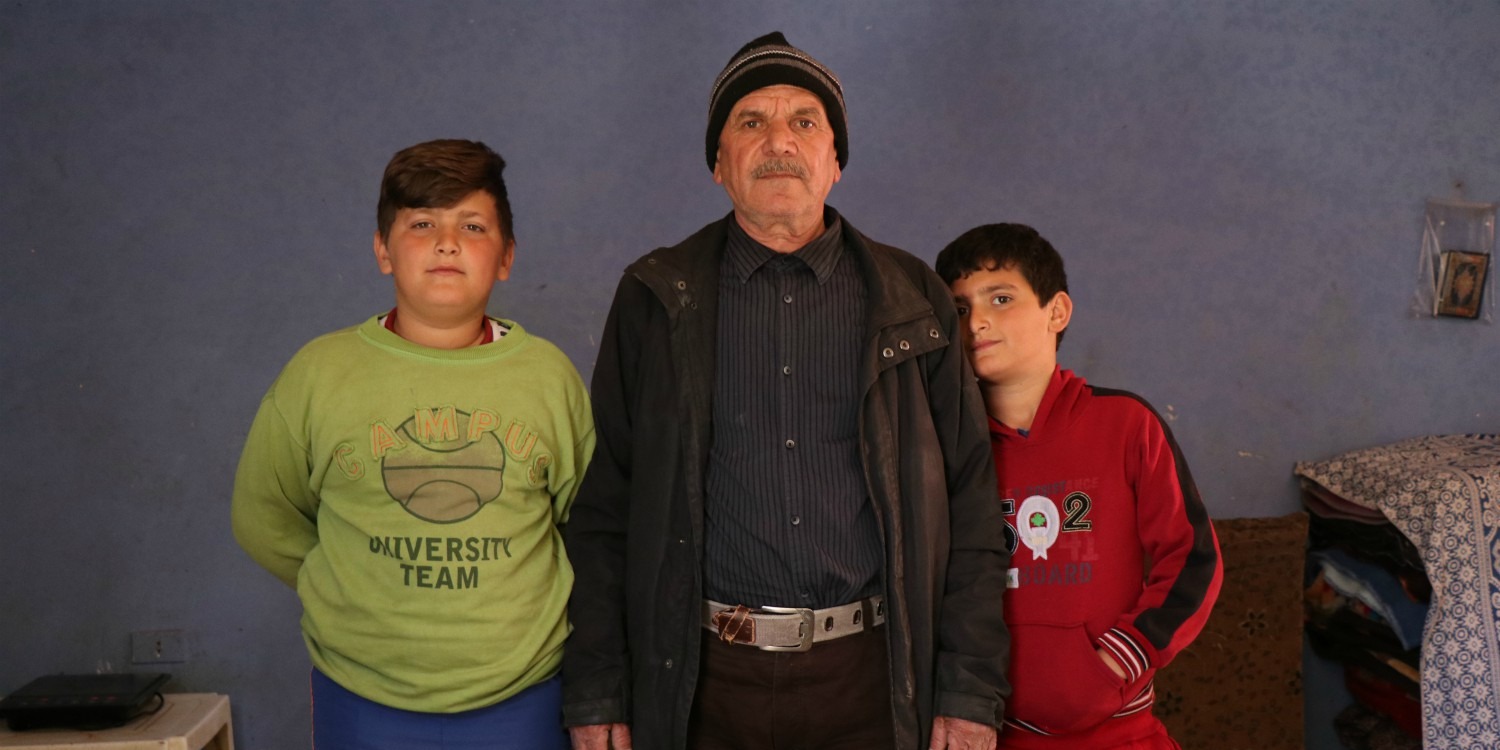In the Middle East, men are single parents, too, and their situations are more fragile if they’re also refugees
Lebanon hosts the largest number of Syrian refugees per capita. The country is currently hosting 1.5 million of the 6.7 million Syrian refugees displaced globally, according to government estimates. Among them are single mothers raising young children on their own with little to provide for them. But what the rest of the world doesn’t often hear about are the single fathers having to raise children, as refugees.
Ibrahim or Abu Mayzar, as he is more commonly known, is a Syrian refugee who lost his wife and who is raising their two sons by himself in Lebanon. Abu Mayzar, who used to live in Al-Hasakah – famed for its fertile fields of wheat, is now living in a single room. The widower and his sons are spending Ramadan as refugees again this year.
“This is Mayzar’s mother holding him 20 days before she passed away. Her name was Ammouna,” he says, pointing to a blurry photo on his phone.
Life has not been easy for this small family of three. Abu Mayzar and his sons are far away from the home where their family was once joined together around an Iftar table, proudly serving the goods of the earth which they had harvested. This now shrunken family is relying instead on humanitarian assistance. Though his sons deserve the most colourful decorations, festive ornaments, and newest clothes, these ‘non-essential’ elements are the last thing on their father’s worried mind.
Since the holy month is a time for big family gatherings, the absence of relatives means the Iftar meal is often lonely and tinged with sadness. Sometimes, refugee families share Iftar together as they cannot afford to serve different dishes at the table solely by themselves.
This year, Ibrahim is hoping for Zakat from fellow Muslims to survive. “Ramadan is the month of giving and good deeds,” he says. “Refugees who live in such difficult situations are eligible for Zakat, for help, and – above all, compassion.”
VOLUNTARY CONTRIBUTIONS
Cash support coming through the U.N. Refugee Agency’s (UNHCR) “Refugee Zakat Fund” has been transformational for single-parent refugees like Ibrahim. The money has helped the family of three who found refuge in Lebanon, buy food, and get back on its feet.
Last year, UNHCR’s Refugee Zakat Fund raised over $43 million and benefited more than 1 million vulnerable displaced persons. Contributions provided through the Fund are not limited to Zakat but also include Sadaqah donations.
This year, the situation for refugees is even more fragile because of the COVID-19 pandemic. From Syria to Iraq, Yemen to the Rohingya, donations allow UNHCR to reach those who have nowhere else to turn.
The Fund released its annual report last month, detailing sources of funding, and more critically, where and how those millions were distributed, in a bid to demonstrate transparency to donors.
Its Ramadan campaign relies almost entirely on voluntary contributions from individuals, institutional partners or kind philanthropists.
LIFE-CHANGING DIFFERENCE
One of the beneficiaries of last year’s Zakat donations is Syrian refugee Nadine, who like Ibrahim, is also a single parent. Nadine’s husband passed away last year, and she is now raising her daughter and her three boys alone.
Originally from Aleppo, the family has been living in Lebanon since 2014, which makes this their sixth Ramadan away from home. “My favorite Ramadan memories are from Syria with my late husband. I used to prepare dinner and wait for him on the balcony. Even if he was late, we wouldn’t eat until he got home,” Nadine says.
“My husband’s death is the hardest thing I’ve had to cope with, and it still makes me feel very sad.”
UNHCR’s cash assistance has transformed the life of the family of five; helping them pay their rent and enabling the children to have what they need to attend school. They have managed to continue their education in Lebanon and are attending the closest public school to their home.
“Thanks to God, the aid that I receive helps me to pay the rent. I use some of it to pay for my children’s school,” says Nadine.
Zeinab, the eldest child, is 12 years old and wants to become a doctor when she grows up. Ahmad, 11, wants to become a hairdresser.
Nadine’s only wish is to always have them around. “I wish for my children to stay with me always. I don’t really want anything else from life,” she says.
Refugee mothers face a wide range of difficulties. Trying to care for young children single-handedly with little or no income is a full-time job. Furthermore, coping with personal grief can make day-to-day obstacles seem overwhelming.
Refugee families in Lebanon are increasingly unable to meet their most basic needs. The 2019 Vulnerability Assessment of Syrian Refugees in Lebanon indicates that more than 90% of Syrian refugee families are in debt, with the average debt per household exceeding $1,000.
Being constantly in debt can lead refugees to adopt crisis and emergency coping strategies, such as withdrawing children from education in order to send them to work or reducing their food intake.
UNHCR aims to provide monthly cash assistance to the most severely vulnerable Syrian refugee families in Lebanon. To help them cope with the coronavirus recession, the UN agency is giving out one-off emergency cash assistance to around 18,000 refugee families in Jordan, and to more than 11,000 families in Lebanon.
| If you would like to support a refugee family in need by giving Zakat or Sadaqah during these blessed last 10 nights of Ramadan, UNHCR’s Refugee Zakat Fund can be accessed HERE. |
© SalaamGateway.com 2020 All Rights Reserved
